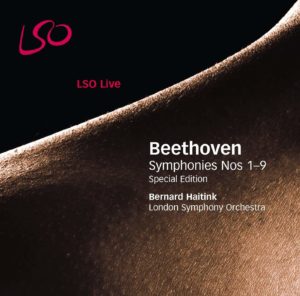With the Penny Marshall film Big playing in the background, I’m drinking a kombucha, eating a Caesar salad, and listening to…
Dutch conductor Bernard Haitink (1929- ), the London Symphony Orchestra, and Beethoven’s Symphony No. 9 in D minor.
I’ve encountered Maestro Haitink eight times previous to this evening, on…
 Day 8. Rating:”Meh!”
Day 8. Rating:”Meh!”
Day 26. Rating:”Huzzah!”
Day 44. Rating:”Huzzah!”
Day 62. Rating: “Meh!”
Day 80. Rating: A very strong “Meh!”
Day 98. Rating: “Meh!”
Day 116. Rating: “Meh!”
Day 134. Rating: “Meh”
Six “Meh!” and two “Huzzah!” ratings.
If I recall accurately, my beef with Maestro Haintink was often because of his tempo, which was too speedy for my tastes.
Let’s see how Beethoven’s Ninth sounds this evening – although, judging by the 68:10 minutes running time (the shortest one yet), I’d say this performance is going to be a little quick, too.
We’ll see.
 Beethoven wrote his symphonies in four parts (except for the Sixth, which is in five). The time breakdown of this particular one (Symphony No. 9 in D minor), from this particular conductor (Haitink, at age 77) and this particular orchestra (London Symphony Orchestra), at this particular time in history (April 29 & 30, 2006) on this particular record label (LSO Live) is as follows
Beethoven wrote his symphonies in four parts (except for the Sixth, which is in five). The time breakdown of this particular one (Symphony No. 9 in D minor), from this particular conductor (Haitink, at age 77) and this particular orchestra (London Symphony Orchestra), at this particular time in history (April 29 & 30, 2006) on this particular record label (LSO Live) is as follows
I. Allegro ma non troppo, un poco maestoso………………….15:35
II. Molto vivace………………………………………..13:50
III. Adagio molto e cantabile……………………………..14:11
IV. Finale……………………………………………..24:32
Total running time: 68:10
My Rating:
Recording quality: 5 (SACD 5.1 multi-channel recording, crisp, clean, powerful – virtually flawless)
Overall musicianship: 5 (engaging, grand, energetic, lyrical)
CD liner notes: 5 (big booklet with lots of pertinent information and essays)
How does this make me feel: 5 (“Huzzah!”)
Despite the quickness of the tempo (especially in Movement I), I was drawn into this performance. Each movement got progressively more interesting.
Movement II (likely the second most famous in the Ninth – after the choral end to Movement IV), sounded remarkable. Highly entertaining.
Movement III – usually my least favorite of the four – was particularly captivating in this recording. The orchestra sounded huge, and the music made me sad. Or, at least, wistful.
Movement IV. The vocals were the best recorded of any I’ve heard to date. Crystal clear. Big. No, make that huge. And the frenetic ending was even more so under the command of Maestro Haitink.
I was expecting disaster for this recording.
Instead, I was surprise by the expertise of the recording engineers, the guidance of Maestro Haitink, and the skill and passion of the musicians.
Highly recommend.
“Huzzah!”
